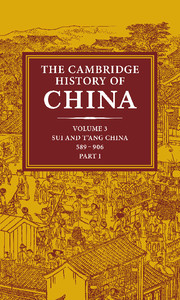Book contents
- Frontmatter
- 1 Introduction
- 2 The Sui dynasty (581–617)
- 3 The founding of the T'ang dynasty: Kao-tsu (reign 618–26)
- 4 T'ai-tsung (reign 626–49) the consolidator
- 5 Kao-tsung (reign 649–83) and the empress Wu: the inheritor and the usurper
- 6 The reigns of the empress Wu, Chung-tsung and Jui-tsung (684–712)
- 7 Hsüan-tsung (reign 712–56)
- 8 Court and province in mid- and late T'ang
- 9 Court politics in late T'ang times
- 10 The end of the T'ang
- Glossary Index
- References
5 - Kao-tsung (reign 649–83) and the empress Wu: the inheritor and the usurper
Published online by Cambridge University Press: 28 March 2008
- Frontmatter
- 1 Introduction
- 2 The Sui dynasty (581–617)
- 3 The founding of the T'ang dynasty: Kao-tsu (reign 618–26)
- 4 T'ai-tsung (reign 626–49) the consolidator
- 5 Kao-tsung (reign 649–83) and the empress Wu: the inheritor and the usurper
- 6 The reigns of the empress Wu, Chung-tsung and Jui-tsung (684–712)
- 7 Hsüan-tsung (reign 712–56)
- 8 Court and province in mid- and late T'ang
- 9 Court politics in late T'ang times
- 10 The end of the T'ang
- Glossary Index
- References
Summary
T'ai-tsung's doubts about the ability of his heir apparent, Li Chih, to lead the country effectively proved to be well founded. Chih, T'ai-tsung's ninth son, was the youngest son born to him by the empress Wen-te, née Chang-sun. Born on the thirteenth day of the sixth month of 628, he had been enfeoffed as the Prince of Chin in 633, and had been heir apparent since 643. When he ascended the throne before his father's coffin on the first day of the sixth month of 649, he was still not quite twenty-one years old. He is known to history by his posthumous temple-name of Kao-tsung.
In spite of the systematic efforts which were made to prepare him for the throne – the appointment of carefully selected tutors and preceptors and the composition of imperial injunctions to guide his behaviour – he proved to be a well-meaning but ineffectual and indecisive ruler.
At the beginning of his reign the new emperor conscientiously attempted to emulate the style of government which his father had practised so successfully. He diligently practised economy, eschewed the hunt and lavish court entertainments, and sought the frank remonstrances and counsel of his court advisers. But T'ai-tsung's highly personal style of leadership demanded qualities and a sheer force of personality which Kao-tsung did not possess. The emperor's ineffectiveness, at least later in his reign, was in part due to recurrent illness, which brought on in-capacitating attacks of dizziness and impaired vision.
- Type
- Chapter
- Information
- The Cambridge History of China , pp. 242 - 289Publisher: Cambridge University PressPrint publication year: 1979
References
- 4
- Cited by

